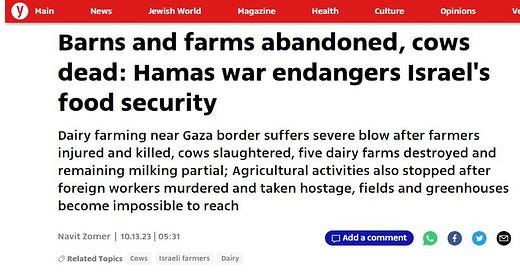Monday October 16 2023: Israel's Ynet News reports that: 'Barns and farms abandoned, cows dead: Hamas war endangers Israel's food security'.
Dairy farming near Gaza border suffers severe blow after farmers injured and killed, cows slaughtered, five dairy farms destroyed and remaining milking partial.
Ynet News goes on to say: Agricultural activities also stopped after foreign workers murdered and taken hostage, fields and greenhouses become impossible to reach.
The war in the south has hit the agriculture sector hard. This includes managers and people working in various sectors who have been either killed or wounded, dairy facilities that have been abandoned, cows that have died and many more that will likely die without appropriate care, and land that’s not being farmed due to the security situation.
Dairy farming has suffered a very harsh blow. “We’ve abandoned dairies in kibbutzim that the army won’t give us access to.," according to Lior Simcha, CEO of the Milk Producers Association. "We have dairies trying to rehabilitate. We’re trying to send in help to care for the cows in kibbutzim like Mefalsim but the army won’t let us anywhere near them. The dairies at Nahal Oz, Alumim and Be’eri are finished. We’re talking about thousands of cows. Some have died and others will. It’s a disaster.”
In the kibbutzim of Nahal Oz, Kisufim, Alumim, Ein Hashlosha and Nir Yitzhak, there are five dairies – all of which send milk to the Tnuva food manufacturer. No milk collections have been made.
CEO of Tnuva’s milk division, Anat Gross-Shon, says that the dairies have been abandoned and there is no one milking the cows.
“If no one gets there to feed and milk the cows, there’ll be no dairy farm. The Israel Cattle Breeders Association is now trying to find a solution to save the cows. We managed to collect milk from the kibbutzim the army allowed us to access - Yad Mordechai, Urim, Tze’elim and Gevim. At this time, Tnuva has no milk shortage. In the worst case, we’ll use milk powder for yogurts and puddings, freeing up fresh milk for drinking milk.
The Israel Dairy Council said that, following several days of no milking in the communities surrounding Gaza due to heavy fighting, the dairy farmers have managed to return to some of the dairy farms and assess the damage. The damage is enormous: Animals have been injured, dairy facilities smashed up and riddled with bullets, buildings and equipment have been thrown around, looted or set on fire.
At present, 11 out of 16 milk-producing communities around Gaza that were attacked are producing some amount of milk. In a further five communities, the damage caused to the infrastructure and the cows does not allow for milk production. Further steps are currently being examined, while considering the security situation and in coordination with the Agriculture Ministry's operations room and military officials.
The Dairy Council clarified that the dairy sector is meeting demand, and that shortages of specific products are caused by supply chain problems rather than shortage of milk.
“The bravery of the dairy farmers in the communities surrounding Gaza is extraordinary," says Itzik Schneider., CEO of the Dairy Council. People stayed on their farms, under fire - some consequently losing their lives. The dairy sector surrounding Gaza has been hit with huge losses, which will become clearer in the coming days. With the security authorities, we’re doing all we can to assist these communities at this difficult time. "
It’s not just dairy farms. The moshavim and kibbutzim around Gaza are the main source of Israel's carrots and potatoes. Kibbutzim such as Nirim, Kfar Aza and Be’eri cultivate vast expanses of fields of carrots and potatoes, both for export and for the Hevel Maon packaging company, marketing under the Dod Moshe brand name.
The towns around Gaza grow tomatoes and eggplants in greenhouses. But farmers are unable to leave their homes to work the fields due to the fighting. On Wednesday, the army started evacuating the residents of Kfar Aza. If the situation continues for a prolonged period during which it will be impossible to farm the land, Israel will experience a shortage of carrots and potatoes.
Last season’s harvest is currently in refrigeration and the next stage is sowing for the winter harvest. If there is no sowing, there’ll be a shortage of winter crops. Presently, the greenhouses cannot be accessed. Residents have been instructed to remain close to their sealed rooms and the Thai laborers are also not working.
“In addition to not being able to leave the house, we’re also concerned that the Thai laborers will be evacuated from the area following the death of 12 Thai laborers on Alumim as terrorists infiltrated the kibbutz. Thai laborers have also been taken captive," said Meir Yifrach, secretary of the Israeli Vegetable Growers Organization, who lived in the moshav of Ohad near Gaza.
Martin Blackham Israel First TV Program





